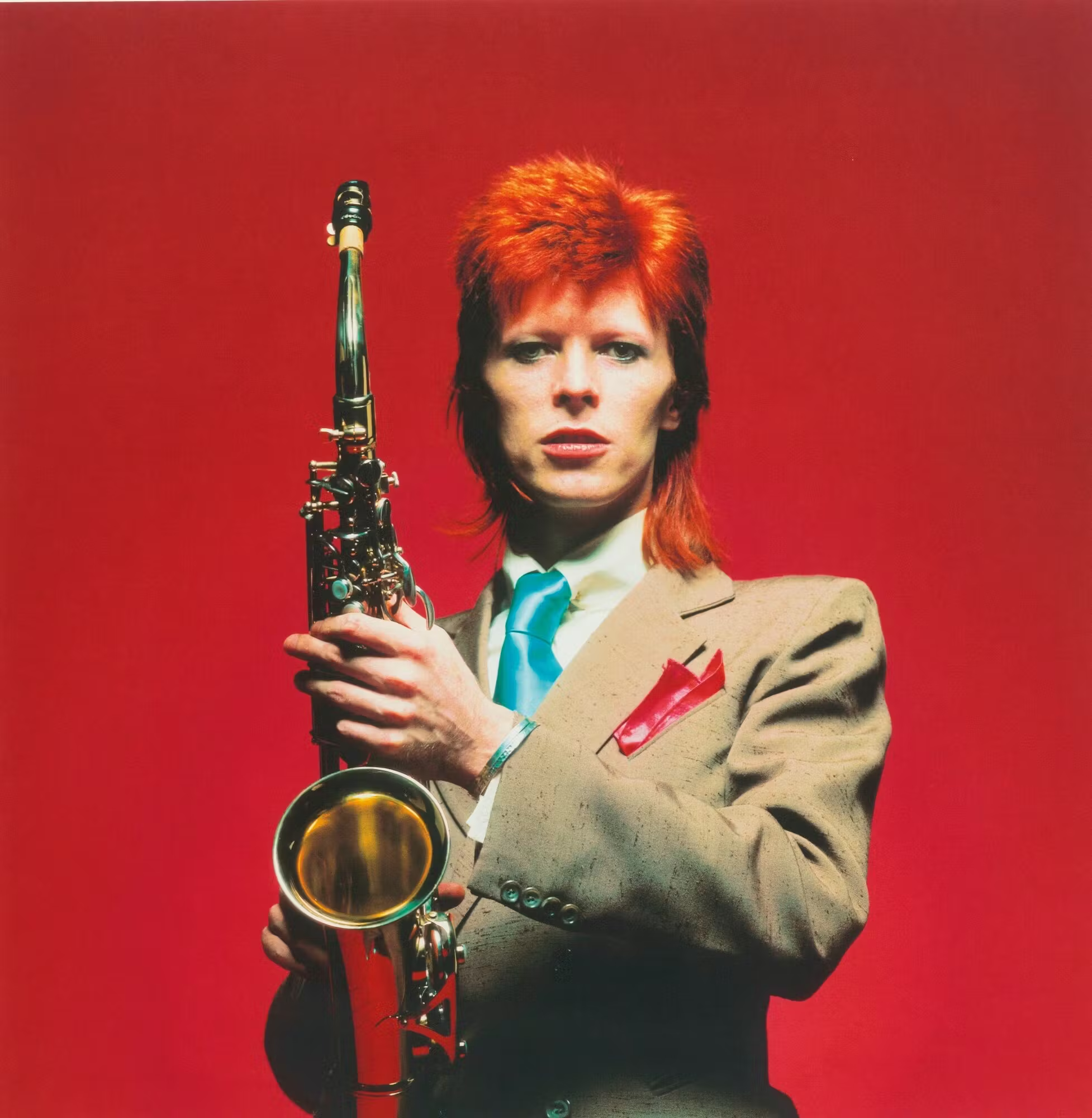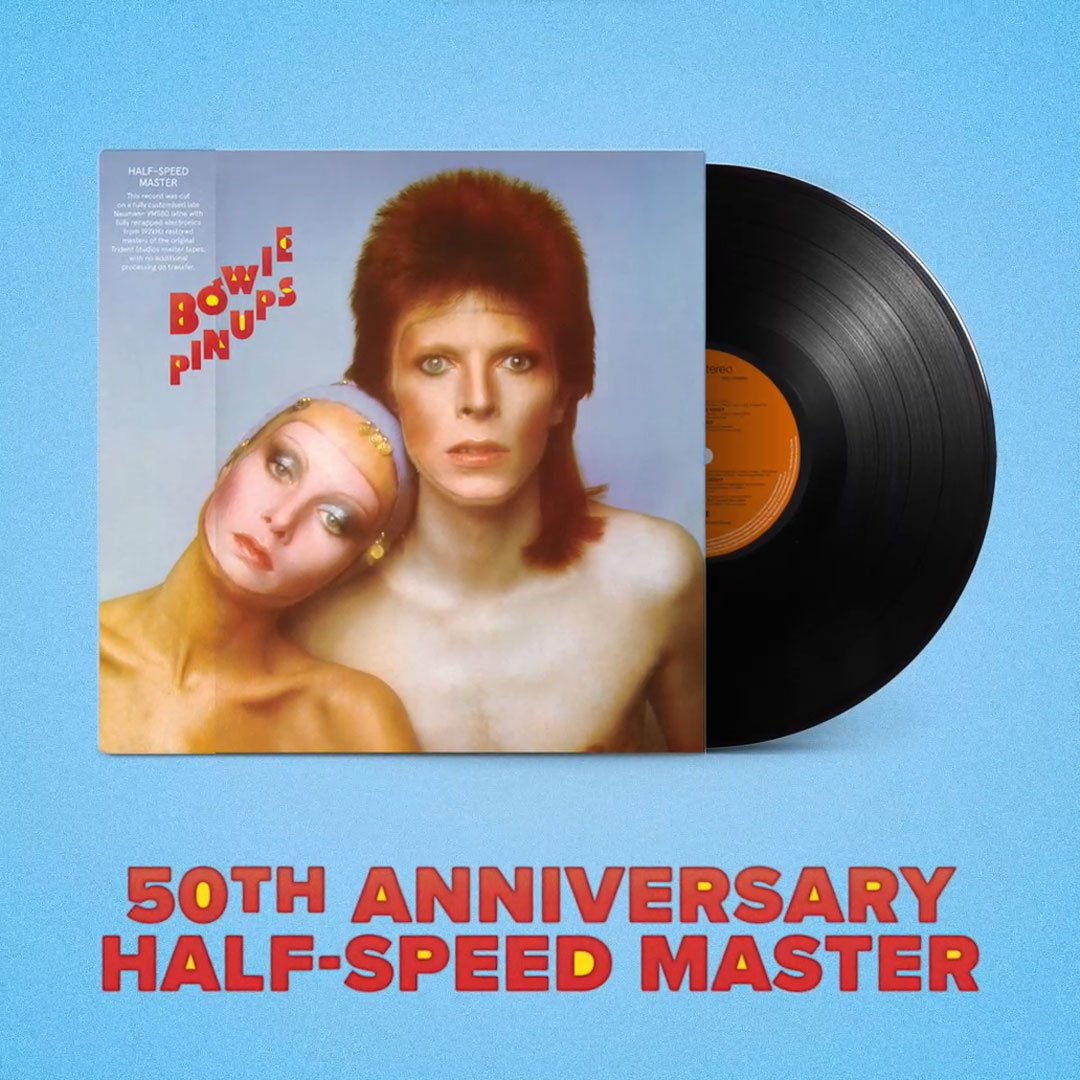50 Years Ago, David Bowie Revisited His Musical Foundation with “Pinups”
A new half-speed master celebrates the album’s anniversary

“Of all the shows on this tour, this particular show will remain with us the longest because not only is it the last show of the tour, but it’s the last show that we’ll ever do.”
David Bowie made this closing statement at London’s Hammersmith Odeon in July 3rd, 1973. After spending ten years joining various groups, having to change his name to avoid confusion with The Monkees’ Davy Jones, penning novelty records, and straying from the “one-hit-wonder” stigma of “Space Oddity,” Bowie found lightning in a bottle with Ziggy Stardust. The channeling of androgyny, kabuki theatre, mime, and glam rock was a winning combination. In retrospect, it’s astonishing that the persona that made the most profound impact on Bowie’s career only lasted a mere two years, resulting in the albums The Rise & Fall of Ziggy Stardust and the Spiders from Mars and Aladdin Sane. To fans, Bowie’s way of “killing off” the character was, in a way, a rock and roll suicide.
Released shortly after the Hammersmith show in October 1973, Pinups was merely a stopgap measure. The album allowed Bowie to pay homage to some of his favorite material from the 1964-1967 period of London. Songs by The Pretty Things (“Rosalyn” and “Don’t Bring Me Down”), The Yardbirds (“I Wish You Would” and “Shape of Things”), and The Kinks (“Where Have All The Good Times Gone”) provided a musical foundation for Bowie during his development as an artist. The cover that’s perhaps best known from this album is his rendition of The Mersey’s “Sorrow,” which reached No. 4 in the UK charts. Bowie reinvents this swinging material with plenty of his musical trademarks. Mick Ronson’s rip-roaring guitar tone replaces the whimsical Farfisa organ in Pink Floyd’s “See Emily Play.” Some of the manipulated vocals are reminiscent of the ones found on Hunky Dory’s “The Bewlay Brothers.” Pianist Mike Garson provides some experimental jazz runs during the song's outro, harking back to his crucial contributions on Aladdin Sane. The most reinventive track is The Who’s “I Can’t Explain.” What was a driving rocker transforms into a raunchy yet sultry groover with saxophones and a Marc Bolan-style vocal delivery. Critically panned for its “inferiority” to the originals, Pinups is both an archetypal covers album and a mere exercise in one of the early 70s biggest trends: nostalgia.
Since Bowie’s passing in 2016, Parlophone has never failed to "jump the shark" in generating fresh products for the market. Various box sets, picture discs, colored vinyl, and direct-to-consumer releases are ways that Bowie’s legacy flag continues to wave high. Since last year, Parlophone launched a line of half-speed master releases to mark some album’s 50th anniversaries, particularly Ziggy Stardust and Aladdin Sane. Despite Pinups being regarded less in Bowie’s vast discography, its 50th anniversary this year allows it to be appropriate for the half-speed master treatment.
 The source of this pressing is the 2015 digital remaster by Ray Staff, previously released in the Five Years 1969-1973 box set and the still-readily-available standalone reissue. Compared to the other albums featured in the set, the remaster for Pinups shone better than the earlier albums. The standalone reissue that’s been out for seven years, mastered by one of Optimal’s anonymous cutting engineers, has sufficed for being an acceptable modern pressing (it's not clear who mastered the box set's vinyl—AIR cutting engineers often didn't inscribe anything in the lead out groove area_ed.).
The source of this pressing is the 2015 digital remaster by Ray Staff, previously released in the Five Years 1969-1973 box set and the still-readily-available standalone reissue. Compared to the other albums featured in the set, the remaster for Pinups shone better than the earlier albums. The standalone reissue that’s been out for seven years, mastered by one of Optimal’s anonymous cutting engineers, has sufficed for being an acceptable modern pressing (it's not clear who mastered the box set's vinyl—AIR cutting engineers often didn't inscribe anything in the lead out groove area_ed.).
John Webber handled the cutting duties for this half-speed master. The subtle differences between the standard reissue and this new half-speed cut don’t produce major sonic revelations. The low and mid frequencies are well pronounced, but compression killed off some of the crispness of the highs. These equalization choices didn't produce an inferior sounding pressing, as I still found myself getting lost in the enjoyment of the glammed-out arrangements. After all, your ears can be a judge (I thought this reissue and the box set version were seriously inferior to a Japanese original, particularly on the bottom octaves, which were MIA here_ed).
The replicated artwork is identical to the standard reissue. An OBI strip, with brief specs about the Neumann VMS80 cutting lathe and non-processed 192kHz files, is included to distinguish its appearance. The design of the original orange RCA label stylized to say “Bowie,” is still a nice touch to see. Optimal delivered the goods with a thick slab of 180g vinyl that does justice to the flimsical nightmare of Dynaflex; ah the 70s!
While undermined as an album, this pressing of Pinups allows listeners to reexamine a fascinating detour from Bowie’s main body of work. While his output under the Ziggy moniker has been honored in this line of anniversary releases, one can hope for further acknowledgment of Bowie’s sense of constant reinvention with more half-speed master releases.








































.png)








